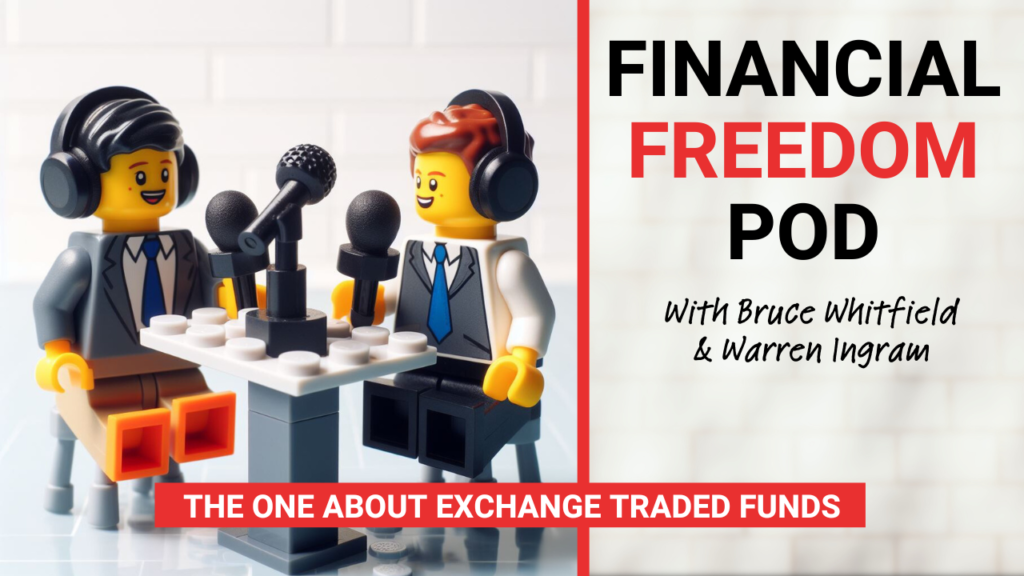
Understanding ETFs
By Warren Ingram, CFP®
One investment vehicle that has gained significant popularity in recent years is the Exchange-Traded Fund (ETF). These financial instruments have revolutionised how people invest, offering unique advantages that make them a compelling choice for private investors who want to build their wealth as a route to financial freedom.
What are ETFs?
At its core, an ETF is an investment that combines the characteristics of both stocks and mutual funds. The primary function of an ETF is to track the performance of a specific index, commodity, bond, or basket of assets. ETFs are bought and sold on stock exchanges throughout the trading day at market prices.
Diversification Made Simple
One of the key advantages of ETFs is the diversification they offer. By holding a basket of assets, such as stocks, bonds, or commodities, an ETF provides instant exposure to a broad market or sector. This diversification helps spread risk, reducing the impact of poor-performing individual assets on the overall portfolio. This means investors can access diverse investments with a single transaction, making it an efficient and cost-effective way to build a well-balanced portfolio.
With numerous ETF options available, investors can choose funds that align with their risk tolerance, investment goals, and cost preferences.
Lower Costs, Higher Returns
Costs are a crucial consideration for any investor, and ETFs shine in this regard. Traditional mutual funds (or unit trusts) often have management fees, sales loads, and other expenses that can affect returns. In contrast, ETFs typically have lower fees, as they passively track an index rather than rely on a team of fund managers. This cost efficiency translates into more money in the investor’s pocket, ultimately contributing to higher long-term returns.
Liquidity and Flexibility
ETFs are traded on stock exchanges, allowing investors to buy and sell their investments throughout the trading day at market prices. This liquidity ensures that investors can easily enter or exit positions, providing flexibility not always present in other investment vehicles. This flexibility gives investors more control over their investment decisions and helps them respond to market opportunities efficiently.
Transparency and Accessibility
Transparency is a cornerstone of ETFs, as most of these funds passively track an index. This means that investors can easily see the assets held within the fund and their respective weights. The transparency of ETFs contrasts with some products, like hedge funds, where the fund manager’s strategy may not always be apparent.
Furthermore, ETFs provide access to a wide array of asset classes and markets that might otherwise be challenging for private individuals to access directly. Whether an investor is interested in international equities, commodities, or fixed-income securities, an ETF is likely available to provide exposure to that specific market area.
Tax Efficiency
Tax considerations are always important, and ETFs offer certain tax advantages that can benefit investors. Due to their structure, ETFs typically experience fewer capital gains distributions compared to some mutual funds. This tax efficiency can help investors minimise their tax liabilities and retain more of their investment returns over time.
Risks and Considerations
While ETFs offer numerous advantages, investors need to understand the associated risks. Market fluctuations can impact the value of ETFs, and the performance of these funds is contingent on the underlying assets they track. Additionally, investors should be aware of liquidity risks, as smaller ETFs might not be traded as regularly as larger ETFs, which can cause their prices to move erratically in the short term.
Not all ETFs are created equal, and investors should carefully evaluate each fund’s objectives, strategy, and costs before making investment decisions. Thorough research and consideration of your risk tolerance and financial goals are crucial components of successful ETF investing.
Conclusion
Exchange Traded Funds have emerged as powerful tools for private investors wanting to navigate the complex financial markets more easily. ETFs provide an accessible and flexible way for investors to build well-balanced portfolios at very low costs. You should do thorough research before making investment decisions and consider the services of a professional if you need assistance.






